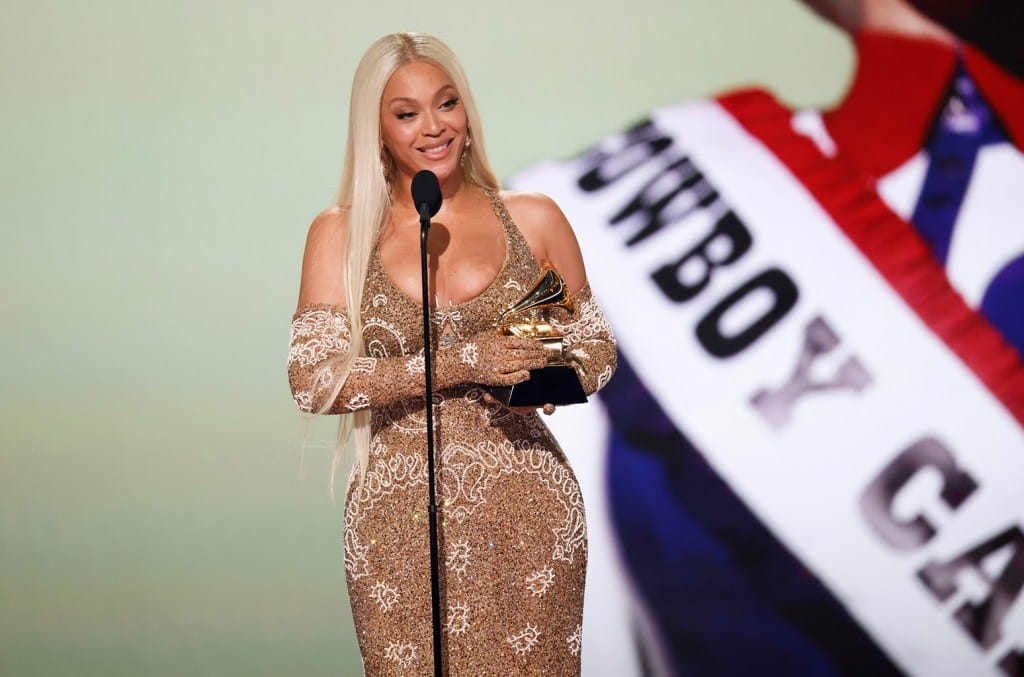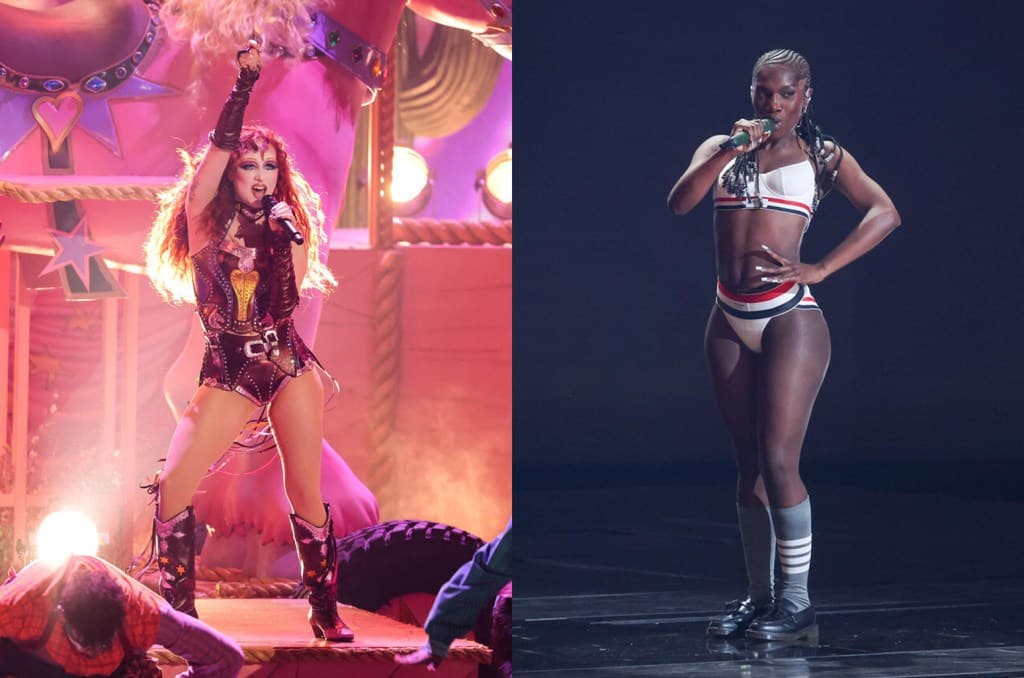Beyoncé’s ‘Cowboy Carter’ AOTY Grammy Victory Feels Like a Lifetime Achievement Award – But Don’t Just Dismiss It as One
Written by djfrosty on February 3, 2025

When Captain Sheila Kelliher Berkoh announced Beyoncé’s Cowboy Carter as the winner of album of the year at the 67th Annual Grammy Awards (Feb. 2), the rapturous standing ovation that swept across Crypto.com Arena seemed to say one thing: Finally.
After five previous bids over the past decade and a half, Beyoncé finally took home album of the year for the second history-making entry in her still-unfurling trilogy that commenced with 2022’s Grammy-winning Renaissance. As Queen Bey embraced her eldest daughter, Blue Ivy Carter (already a Grammy winner in her own right), and began to make her way to the stage, the room rejoiced. Lady Gaga and Billie Eilish wept, Cynthia Erivo leapt up and down, Taylor Swift shared a toast with Jay-Z, Olivia Rodrigo cheered and GloRilla screamed till she damn near couldn’t anymore. At long last, the First Lady of Music – as dubbed by one Clive Davis – had finally won the industry’s most coveted prize.
With her victory, Beyoncé not only extended her lead as the most-awarded artist in Grammy history (35 wins), but she also joined Natalie Cole (Unforgettable With Love, 1992), Whitney Houston (The Bodyguard, 1994) and Lauryn Hill (The Miseducation of Lauryn Hill, 1999) as just the fourth Black woman to ever win album of the year. It’s that nugget of history, coupled with her litany of egregious General Field snubs that made this moment such a sweet one to witness.
Trending on Billboard
But let’s be careful not to let “overdue” narratives completely obfuscate the artistic merit of Cowboy Carter. Leading up to last night’s ceremony, many publications – including Billboard – predicted that Cowboy Carter would take home top honors. Across social media and some of those pieces, narrative started to build that a Cowboy Carter victory would be like Leonardo DiCaprio winning for The Revenant or Martin Scorsese winning for The Departed – or like Beck winning for Morning Phase in 2015, the year of Bey’s first major album of the year loss. After being passed over for what many consider to be their best efforts, acclaimed artists who consistently produce the best work in their respective industries finally earn the highest honors in their field. In the same way that DiCaprio is an actor’s actor and Scorsese is a director’s director, Beyoncé is an artist’s artist. That much was clear when the 2023 Grammys turned into a Bey pseudo-meet-and-greet, and the room’s ecstatic reaction to her victory last night was another reminder. As far as many are concerned, Cowboy Carter’s win is equivalent to a lifetime achievement award; a mea culpa of sorts for snubs of years past.
There’s nothing inherently wrong with that framing, but it does belie the fact that Cowboy Carter would have deserved to win whether it was Bey’s first album of the year nod or her tenth. Less than two years after flipping the dance-pop world on its head with Renaissance, a record that illuminated the Black queer roots of dance music and culture, Beyoncé strutted into yet another new genre and made it completely her own, while venerating some of its most respected (and overlooked) pioneers.
She opened the album with “Ameriican Requiem,” a Buffalo Springfield-nodding tour de force that served as a musical funeral for not just the most limiting visions of America, but also the overwhelmingly white country music establishment that unfairly made themselves the gatekeepers of who can lay claim to country music, aesthetics and identity. Over the 26 subsequent tracks, she assumed and illustrated different Western motifs and characters (the sheriff, the damsel in distress, the outlaw, etc.), ending with “Amen,” an anthem of hope for a new, limitless vision of America that interpolates the album opener.
Cowboy Carter reaped a whopping 11 nominations across several different genres, a point she emphasized with the brilliant three-track run of “Jolene,” “Daughter” and “Spaghettii.” With her reimagining of Dolly Parton’s classic, Beyoncé turned the country icon’s desperation into a fierce understanding of self-worth that simultaneously aligned her existing musical and lyrical brand with Parton’s track, while also serving as a callback to the “Becky” character that haunted 2016’s Lemonade, which infamously lost album of the year to Adele’s chart-conquering 25. “Jolene” gives way to “Daughter,” a positively stunning take on the country murder ballad that finds Beyoncé ripping through an operatic rendition of “Caro Mi Ben” in the original Italian before recruiting Linda Martell, the first Black woman to play the Grand Ole Opry, and Shaboozey, the man who would come to be the voice behind the longest-running solo Billboard Hot 100 No. 1 single in history (“A Bar Song”), for “Spaghettii.” Nominated for best melodic rap performance last night, “Spaghettii” mines the cross-cultural history of spaghetti westerns to create a folk-inflected trap heater assisted by a Brazilian funk sample (O Mandrake’s “Aquecimento das Danadas”). And that’s just the first half of the LP!
There’s also “Alliigator Tears,” on which Bey is seemingly singing directly to the Recording Academy. “You say move a mountain/ And I’ll throw on my boots/ You say stop the river from runnin’/ I’ll build a dam or two/ You say change religions/ Now, I spend Sundays with you/ Somethin’ ’bout those tears of yours/ How does it feel to be adored?” she posits in the chorus. Of course, there’s also the rising contemporary Black country talent she highlighted across the album (Tanner Adell, Brittney Spencer, Willie Jones, Reyna Roberts and Tiera Kennedy), and let’s not forget her Jersey club flip of Patsy Cline’s seminal “I Fall to Pieces” either. We don’t even have to get into the historic chart achievements of the era or the cultural impact it had across fashion and business – Cowboy Carter is worthy enough based solely on its 27 gorgeous songs.
Not a single one of the other nominees for album of the year boasts the archival ambition, depth of research, courage, experimentation, soul and sheer scope of Cowboy Carter. The album is closer to a master’s thesis than a standard pop album, but it’s also relentlessly fun. Whether she’s going full Western camp on “Tyrant,” crafting a friendship anthem for the ages alongside Miley Cyrus on “II Most Wanted” or blazing through a crash course in rock ‘n’ roll history on “Ya Ya,” Cowboy Carter is a blast. The record received some flak for its length and people considering it a “chore” to sit through because of how heady it can get at certain points; Cowboy Carter, in some circles, became something to be respected, but not enjoyed. In reality, Beyoncé crafted the album with so much verve that there really isn’t a way for Cowboy Carter to not be the ultimate hoedown. Is it Beyoncé’s best album? Depending on the day, maybe. Is it frustrating that the Recording Academy couldn’t reward her for making paradigm-shifting music in her home genre of R&B? Unequivocally. But none of that makes Cowboy Carter underserving of its victory in the 2025 album of the year race.
There’s a reason the album collected two other wins last night, just like how The Departed and The Revenant won additional Oscars outside of Scorsese and DiCaprio. Their victories may have been delayed, but they still triumphed for excellent and deserving work. Pity wins those were not. Yes, this win is a vindication of her past losses, a tribute to her towering career, and a nod to the Black women before her who were denied time and time again, but above all, it’s a win for Cowboy Carter specifically – and that’s the most important takeaway from last night.

 State Champ Radio
State Champ Radio 





